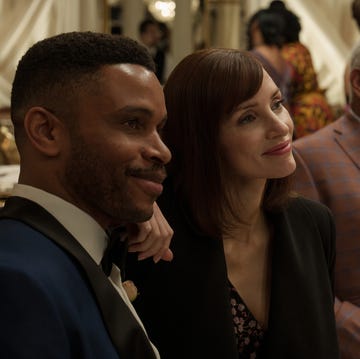Fifteen years after separating from my first husband – and four years after our painful divorce – this month, I’m getting married again. It’s a time of great happiness – in Jeremy, an American playwright, I have finally met my soulmate.
I’m 57 and Jeremy is 55. So much of my happiness also comes from the maturity and lessons of midlife, which battles to pick, which to let go – and where and when to put my foot down. That goes for Jeremy as well, by the way.
Dr Sheri Jacobson is a retired psychotherapist and the founder of Harley Therapy. ‘Second marriages offer hope and the prospect of a new start,’ she says. ‘Each partner is a little more knowledgeable and has more life experience, confidence and self-awareness.’
And yet, there are complexities in second marriages. ‘You’re not just marrying a person in isolation, but arriving with a fuller set of responsibilities than you perhaps had in your 20s or 30s,’ says Dr Jacobson. ‘You’re likely to have children, which brings a whole extra dynamic, as does the challenge of looking after ageing parents. Then there’s the way you set up your home and your finances – how you approach chores, cleanliness and visitors. We each come into a relationship with a whole life lived.’
So, how am I balancing the chance for a glorious fresh start with the grizzled lessons of experience? What do the experts have to say? Can I really avoid the divorce courts for a second time? Read on…
1) I have my eyes open about linking my life with another adult
When I married my ex at the age of 33, I was so excited by the notions of a white dress and setting up a home and family, I skated over some of the finer details – details that seemed small, but set up insurmountable problems for the future. For example, I was dead set on living in north London; it later transpired that my ex would rather have settled in the western part of the capital, and that bred resentment.
‘It’s always a good idea to have a “relationship audit” before you marry again,’ says psychologist and relationships expert Susan Quilliam. ‘Don’t think that, just because you’ve been married before, it means you know what you’re letting yourself in for. This is a whole new deal.’
Susan suggests sitting down and really talking through the whole spectrum of what matters to you, from where you live to how you show affection and what time you like going to bed. ‘The expectations you bring into your marriage could trip you up,’ says Susan. ‘For example, your partner may think love is all about buying you presents; you may think it’s about kisses and affection.’ Make sure you really know the deal before you sign it.
2) I know how to communicate more effectively and am less scared of rejection
My ex-husband and I had different styles. He was quiet – and I often waited too long before discussing difficult issues, which occasionally led to teary outbursts from me. Luckily, I have now learned to be more confident in approaching issues head-on, before they fester. ‘Conversation and discussion reduce the prospect of resentment,’ says Dr Jacobson.
Owen O’Kane is a psychotherapist and the author of Addicted To Anxiety. ‘We’re all familiar with the blame game: “He did this; she did that,”’ he says. ‘The trick is to notice the feeling evoked in yourself when a person does something you don’t like. You may be telling yourself, “He makes me angry,” but, actually, you are angry – you’re responsible for your own emotions.’ And once you have identified the emotion in yourself, it’s important not to shy away from it or bury it, in the hope that the issue will go away. It probably won’t and you’ll store up resentment – or be on the other end of it.
3) I’m better at arguing – and know when to back off
The first step, says Owen, is to be aware of what’s causing a conflict between you and your partner, and the second is to ask yourself whether you’re willing to take some responsibility for it.
Take a moment to understand what has been ‘activated’ in you by a situation: anger, disappointment, sadness. ‘Never react in the moment,’ says Owen. ‘Then, ask yourself whether there’s another perspective you might consider. After a cooling-off period, make sure you speak to the person when you can balance rationality and emotion.’ Susan recommends waiting 20 to 30 minutes after an argument, to allow your adrenaline to subside.
4) I’m going to pick my battles
Private school or state school? Curtains or blinds in the kitchen? Spain or Italy this year? The latter years of my marriage were marked by disputes from the fundamental to the mundane.
‘I see relationships as a knickerbocker glory,’ says Susan. ‘At the bottom are the non-negotiable: for example, whether you want to have another child. The next level up are the locations – where do you want to live?’ The latter is particularly relevant to Jeremy and me: he’s a New Yorker and we have decided to set up home (for now) in the UK, but I couldn’t take this for granted and we had several long discussions before committing.
Higher up Susan’s dessert hierarchy come decisions such as what food you prefer to eat, the decor in your home, the holidays you want to take. ‘The closer to the top the decision, the more feasible it is that you should compromise,’ she says.
That’s unless it comes to sleeping on the left-hand side of the bed – that, for me, is non-negotiable (and, fortunately, Jeremy is happy to take the right).
5) I’m more in control of my money
I’m slightly ashamed to say that, when it came to finances, I stuck my head in the sand during the course of my first marriage. Yes, I always had a job and never went into debt, but when it came to pensions and ISAs, I wasn’t fully up to speed. And when I discovered my marriage was over, I panicked about how I would manage financially. This contributed to me falling into a tailspin of anxiety and insomnia, which took me years to recover from.
I’m now better at this sort of thing. Once you’ve been through a divorce and bought your own flat, you wake up about money – and I won’t be backsliding in my second marriage.
‘Money becomes more important later in life and discussions around it always have an emotional component,’ says Susan. ‘You need to protect your savings and, if you’re in midlife, will probably have an eye on retirement.’ She suggests that, before a second marriage, new partners have a face-to-face discussion about their finances. ‘Your assets might be uneven,’ points out Dr Jacobson.
‘Thrash out the contribution each person is going to make,’ she says. ‘It should be equal, but that doesn’t have to be financial if each party comes in with different amounts. People bring value in other ways: looking after the house or planning holidays for example.’
6) I’m more realistic – and won’t fall apart if the worst happens
The first few years of my first marriage were happy. My ex and I often laughed about silly things and had similar values when it came to bringing up our children and the importance of hard work and education. Deep down, however, we were never totally suited. This didn’t stop me being deeply upset when I found out that our marriage was over – our split really tugged the carpet from under my life in all sorts of ways.
This time around, I feel like I’m building from a more stable base. ‘In a second marriage, you’re more solid, more experienced and less impressionable,’ says Dr Jacobson. Susan agrees. ‘People who have been through difficult break-ups know they’re able to survive,’ she says. ‘They’re less likely to be looking for a relationship to complete them.
‘For this reason, second marriages can have the potential to be far stronger – especially if you have finally met your soulmate.’













![©ITV from monumental television frauds sr1pictured: jodie whittaker as sam suranne jones as bert this photograph is (c) itv plc/ monumental television and can only be reproduced for editorial purposes directly in connection with the programme or event mentioned above, or itv plc. this photograph must not be manipulated [excluding basic cropping] in a manner which alters the visual appearance of the person photographed deemed detrimental or inappropriate by itv plc picture desk. this photograph must not be syndicated to any other company, publication or website, or permanently archived, without the express written permission of itv picture desk. full terms and conditions are available on the website www.itv.com/presscentre/itvpictures/termsfor further information please contact:michael.taiwo1@itv.com](https://hips.hearstapps.com/hmg-prod/images/frauds-sr1-first-look-03-6891d81c2d536.jpg?crop=0.428xw:0.643xh;0.0641xw,0.116xh&resize=360:*)